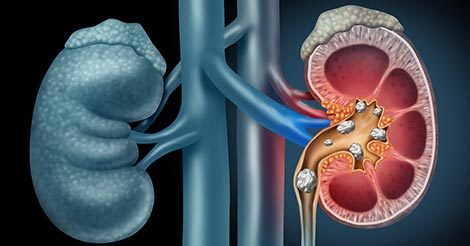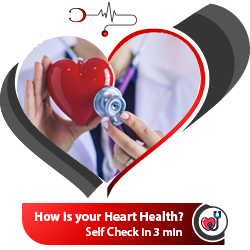Kidney Stone: Causes, Symptoms and Prevention
What are Kidney Stones?
Kidney stones are small hard crystalline masses made of minerals and salt materials, which are built inside the kidney or may get down in the urinary tract. The medical terms for the kidney stones are nephrolithiasis and renal lithiasis. Around 11 to 13% of adults in the world suffer from chronic kidney diseases. The size of a kidney stone can vary; it can be of a few millimeters or of a few inches as well. The movement of the stone, which takes place through the narrow pipes of the urinary tract, can result in severe pain.

Kidney Stones Types
These stones can be classified into different types based on their chemical composition which are as follows:
- Cystine stones
- Struvite stones
- Calcium stones
- Uric acid stones
Kidney Stone Symptoms
You won't be able to see the signs until the stone moves around your kidney area or passes into the ureter. The symptoms are as follows:
- Nausea and vomiting
- Severe pain below the ribs
- Blood in urine (hematuria)
- Pain or a burning sensation during urination
- Pus or white blood cells in urine
- Constant urge to urinate
Kidney Stone Causes
- The main cause of a kidney stone issue is not having adequate water in your body
- Obstruction caused to the flow of urine can also result in causing the formation of stone
- Traces of infection in the urinary tract
- Obesity
- A diet with high levels of glucose, protein and salt
- A family history of kidney stone
- Some medical conditions can increase the risk of formation of kidney stone
- Hypercalciuria - High calcium found in the urine
- Chronic diseases- High blood pressure and diabetes
- People who have undergone ostomy surgery or intestinal bypass.
Kidney Stone Diagnosis & Treatment
- To identify the kidney stone, imaging test is suggested.
- Blood testing will help in revealing the amount of uric acid and calcium in blood.
- Urine testing.
- CT scan of the abdomen.
Treatment of these kidney stones may vary according to its type and even the cause of it.
- You may treat small stones while continuing your simple day-to-day activities. Drinking plenty of water, taking some pain relievers like ibuprofen, naproxen sodium and acetaminophen, along with medical therapies like alpha-blocker will help you in clearing the kidney stone without causing too much pain.
Following methods are available for removal of larger stones -
- Making use of sound waves to break the stones- Some doctors may recommend you to undergo the procedure known as ESWL (Extraxcorporeal Shock Wave Lithotripsy). This uses sound waves to shock waves, which break the stone into small pieces.
- Percutaneous nephrolithotomy is a surgical procedure used to remove large stones.
- Parathyroid gland surgery.
- Making use of scope.
Kidney Stone Prevention
Kidney stone prevention is possible with a few changes in lifestyle accompanied by proper medication. Make sure that you drink enough water and have a diet for kidney diseases which is low in salt and has animal protein.
If you notice any symptoms, you should immediately consult the physician for further investigation. However, a simple way to keep track of your health is a regular complete master health checkup, which analyses different health parameters and makes you aware of the necessary steps before it is too late. Different hassles like pain, fear, loss of valuable time and burden of medical expenses can be avoided if you go for a regular health checkup. Avoid the risk of severe kidney diseases with the help of a quick and simple health checkup.
Written By: Indus Health Plus Doctors Team
Related Health Checkup Packages
-
CREATININE - SERUM test1
1 Tests
Offer Price 200 -
LIVER KIDNEY MICROSOMES test1
1 Tests
Offer Price 770










